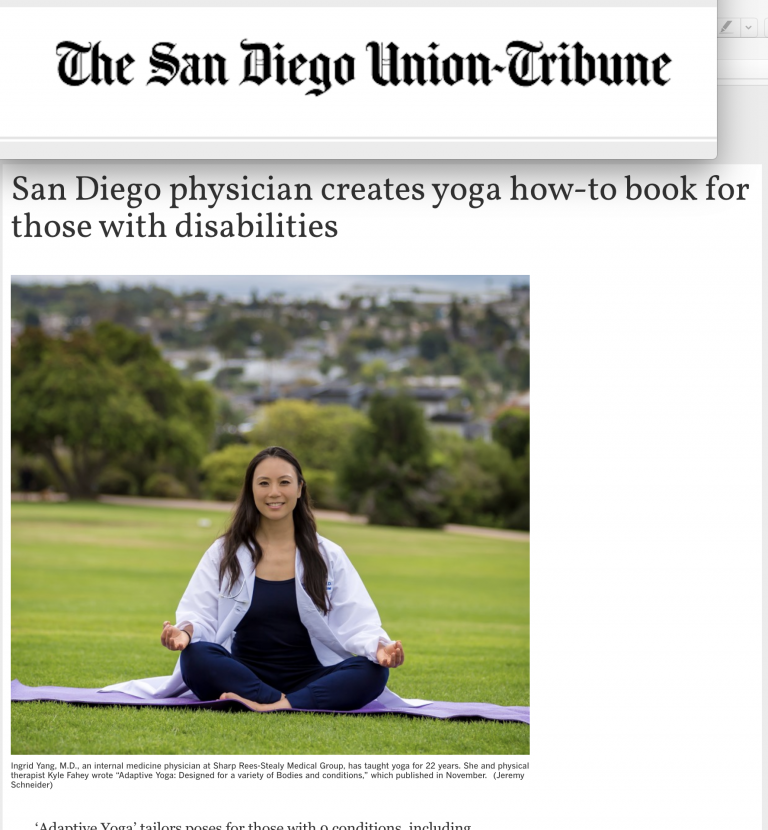This article was originally published in the San Diego Union Tribune on January 5, 2021
https://www.sandiegouniontribune.com/news/health/story/2021-01-05/san-diego-physician-creates-yoga-how-to-book-for-those-with-disabilities
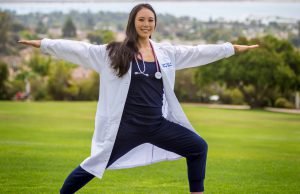
‘Adaptive Yoga’ tailors poses for those with 9 conditions, including Parkinson’s, arthritis, stroke and multiple sclerosis
A long and varied path led Ingrid Yang to her multifaceted career. An internal medical physician with the Sharp Rees-Stealy Medical Group, Yang, 41, also has been a yoga teacher for 22 years. Because her residencies included physical therapy and rehabilitation, it was a natural progression to develop yoga poses specifically designed for people with disabilities.
Yang collaborated with physical therapist Kyle Fahey to write the book, “Adaptive Yoga: Designed for a variety of bodies and conditions,” published in November.
“Yoga is intrinsically modifiable,” Yang said. “There’s a huge variety: hardcore hot yoga, laughing yoga, restorative yoga. And yoga offers so many ways to modify, including blocks, bolsters and walls.
“People with chronic medical conditions have an increased risk of depression and anxiety. Yoga is good at decreasing anxiety attacks and depressive responses. Yoga is a tool that’s not pharmaceutical. Using breath is important. When we deepen our breath, we can release frustration and let go.”
The book offers yoga adaptations for nine disabilities: low back pain; osteoarthritis of the hip and knee; rheumatoid arthritis; lower limb amputation; spinal cord injury; Parkinson’s disease; stroke; multiple sclerosis; and cerebral palsy.
These disabilities are fairly common, and Yang has worked closely with patients who have them. Many gave her feedback as she and Fahey were formulating the adaptations.
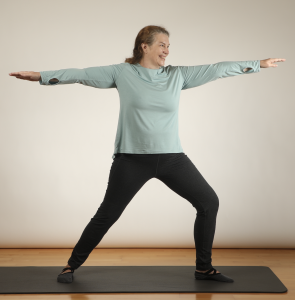
“Adaptive Yoga” was written for physical therapists and yoga teachers, and for people who have one or more of those conditions. It offers clear instructions and explanations in straightforward language, and each pose is accompanied by an illustrative photo.
But you won’t see supermodels demonstrating Warrior II or downward-facing dog.
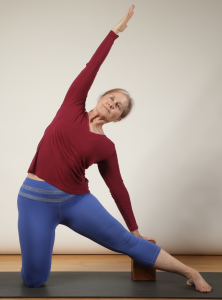
“When we think about yoga, we envision the perfect gymnast doing unbelievable positions. And we think: ‘I can’t do that!’ ” said Yang, who tends to acutely ill patients at Sharp Memorial Hospital in Kearny Mesa.
“Every single one of the models in the book has the corresponding disability. That was important to me. What’s the point in me showing an amputee how to do a pose? Working with the models and with my students taught me how to actually write this book.”
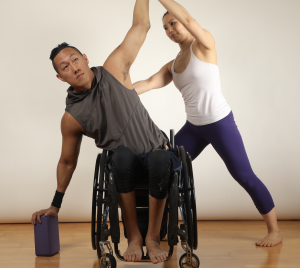
‘An incredible feeling’
Nikki Armstrong was one of the first participants in sessions led by Yang and Fahey as they developed an adaptive yoga program at the Shirley Ryan AbilityLab in Chicago.
Armstrong, who had practiced yoga since high school, attended a cousin’s wedding in October 2018. A day or two later, the then-24-year-old woke up with what she described as “zombie arms.”
Within a few days, she was unable to walk or swallow.
Armstrong was eventually diagnosed with Guillain-Barré Syndrome (GBS), a rare autoimmune disease in which the body’s immune system attacks the nerves. It can result in complete paralysis.
She began to recover through a blood exchange procedure, but the impact of her paralysis was severe. She soon began physical therapy in Chicago, even while on a ventilator.
“That’s how I met Ingrid Yang,” said Armstrong, whose voice wavered from emotion as she recounted her story. “I remember going to class in my wheelchair. I was so touched by the fact that I could still do movement, I could do yoga, even with these limitations. It was an incredible feeling.”
Now 26, Armstrong works full time and can walk, run, and practice yoga like she did before contracting GBS. Besides numbness in her feet and occasional balance issues, she feels back to her former self.
“Ingrid has medical knowledge and incredible expertise in all things yoga, Armstrong said. “I’ve never been in a class so alive — everyone was excited about the possibilities of adaptive yoga. It’s not very well known and I’m glad the book will spread the word.”
‘Truly accessible for all’
Publishing “Adaptive Yoga” now was not ideal. Yang said the initial plan was for her to do book signings and demonstrations at yoga studios across the country.
She immediately put those plans on hold because of the pandemic. She’s trying to promote the book, available on Amazon, through social media and other safe methods.
“I think this book is important,” Yang said. “I didn’t want to write something no one would read. But I want to act in a manner that is responsible. The consequences of actions that would have seemed so benign are so serious now.”
In 2017, Yang transferred from Chicago’s Northwestern University to do her residency in internal medicine at Scripps Green Hospital. Since 2018 she has combined taking care of patients at Sharp Memorial with writing the book. Until the pandemic hit, she was also presenting yoga demonstrations worldwide.
Soon she will be offering livestream adaptive-yoga training seminars, including one on Jan. 16 for yoga teachers and medical professionals.
People who fall outside of those realms may benefit from reading “Adaptive Yoga.” Yang encourages seeking out a teacher or guide to help.
“If you may not be ready to do that, I’d recommend reading the chapter for your specific condition in its entirety. Then, determine by your own good judgment what poses and sequences resonate with you,” she said.
“There may be certain postures that you have been doing naturally without knowing they are yoga. Better yet, there may be poses that you aspire to that you can discuss with your physical therapist or yoga teacher.
“The book was written in plain terms to make it truly accessible for all. No yoga background is necessary, just a curious mind and a belief in yourself.”
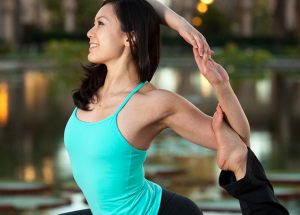
Dr. Ingrid Yang’s thoughts on breathing
- “Dozens of breathing techniques are available. Practice what feels comfortable for you. Some techniques utilize slow, diaphragmatic breathing, and others use a more rapid, energetic breath.”
- “There is no one-size-fits-all. Once you have practiced a breathing technique and mastered it, you can start to explore others recommended in ‘Adaptive Yoga.’ ”
- “Be mindful of your breath.”
- “This mindfulness of the breath in each posture is the essence of yoga and a breathing technique itself.”
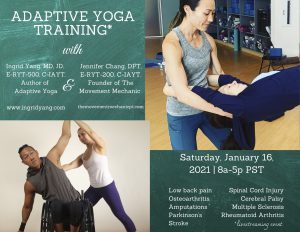
Adaptive yoga training
A livestream training for yoga teachers and medical professionals
Instructors: Ingrid Yang, author of “Adaptive Yoga,” and Jennifer Chang, founder of The Movement Mechanic
When: Jan. 16, 8 a.m. to 5 p.m.
Cost: $425
For more information: ingridyang.com/retreats-trainings/adaptive-yoga-training
Wood is a freelance writer.

